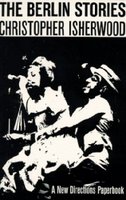Isherwood, Christopher. Goodbye to Berlin (1939). New York: New Directions, 1945.
 I'm very much in love with Christopher Isherwood of late. His self-directed-yet-self-negating sensibility something something something. I'm oddly having one hell of a time writing about this book, probably because I'm too busy thinking about this one.
I'm very much in love with Christopher Isherwood of late. His self-directed-yet-self-negating sensibility something something something. I'm oddly having one hell of a time writing about this book, probably because I'm too busy thinking about this one.Isherwood's book is famous, even if you've never heard of it. Here's the second paragraph:
I am a camera with its shutter open, quite passive, recording, not thinking. Recording the man shaving at the window opposite and the woman in the kimono washing her hair. Some day, all this will have to be developed, carefully printed, fixed (1).It's a posture of course, in that "Christopher Isherwood" (the first-person narrator of this novel) is thinking and assessing all the time. It's a kind of electric persona he uses, so much so that I read David Sedaris (and, to a lesser extent, Rakoff) on every other page:
He will never tell me anything about himself, or about the things which are most important to him. And because I am not as he is, because I am the opposite of this, and would gladly share my thoughts and sensations with forty million people if they cared to read them, I half admire Bernhard but also half dislike him (158-9).Is there a gay male autobiographical raconteurian sensibility?
This book became I Am a Camera with Julie Harris and then it became Cabaret with Liza Minelli—both women playing the role of Sally Bowles, who I found to be one of the lesser interesting characters in the book. But she's straight and pretty and sexed-up and tragic, and so she reads well with mainstream audiences, I imagine. My favorite is Isherwood, in either author or narrator mode; whoever it is that produced the following:
You can feel [the Prussian plains] all round you, to-night, creeping in upon the city, like an immense waste of unhomely ocean—sprinkled with leafless copses and ice-lakes and tiny villages which are remembered only as the outlandish names of battlefields in half-forgotten wars. Berlin is a skeleton which aches in the cold: it is my own skeleton aching. I feel in my bones the sharp ache of the frost in the girders of the overhead railway, in the ironwork of balconies, in bridges, tram-lines, lamp-standards, latrines. The iron throbs and shrinks, the stone and the bricks ache dully, the plaster is numb (186).


0 Comments:
Post a Comment
<< Home